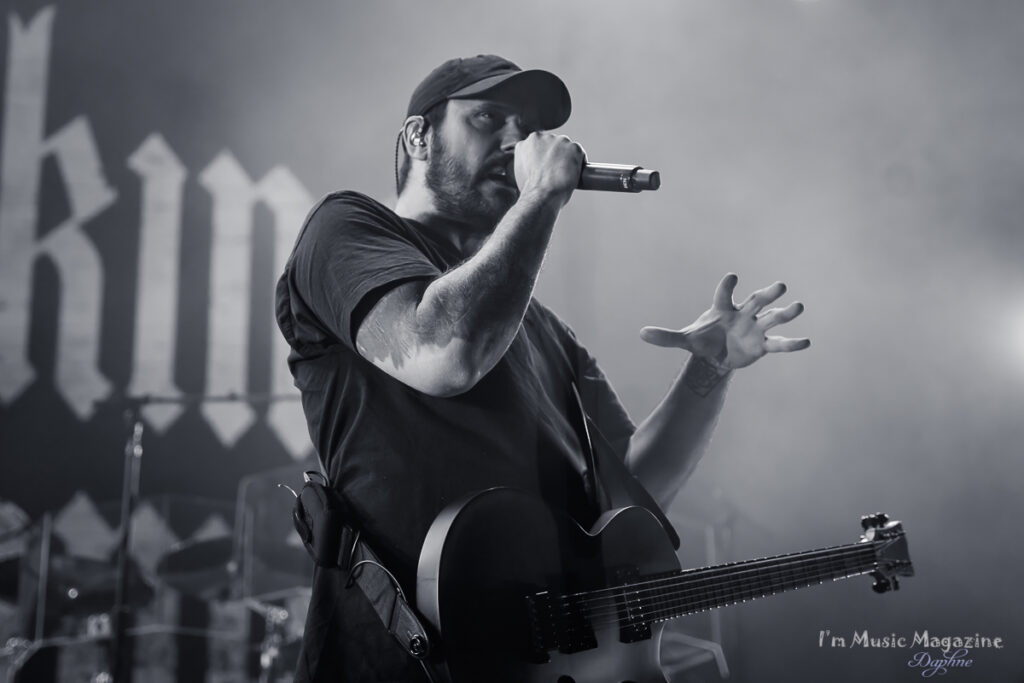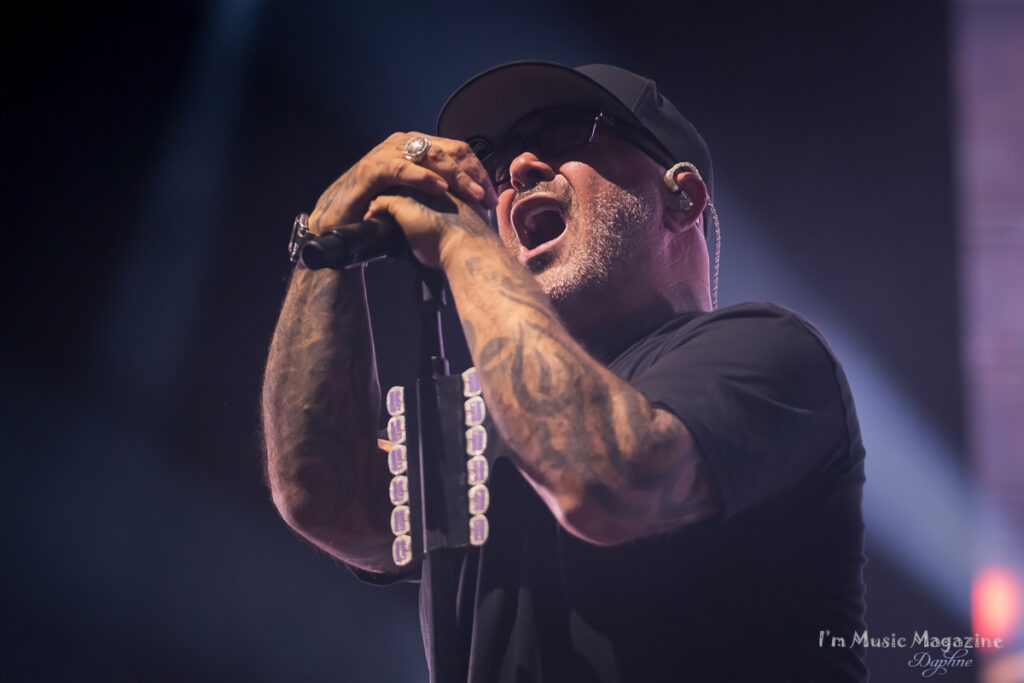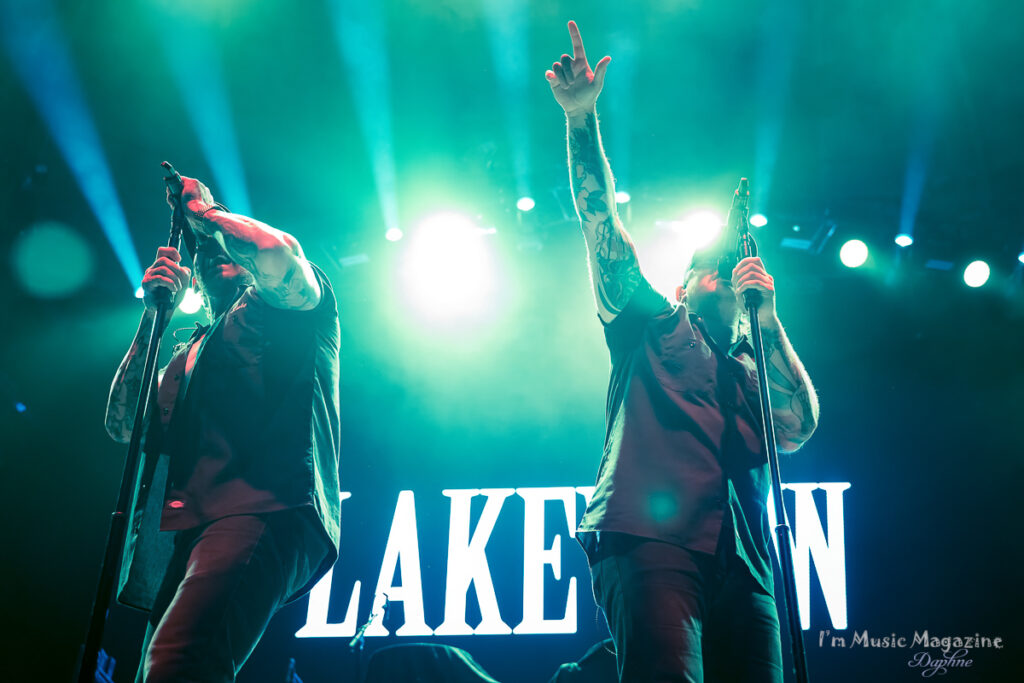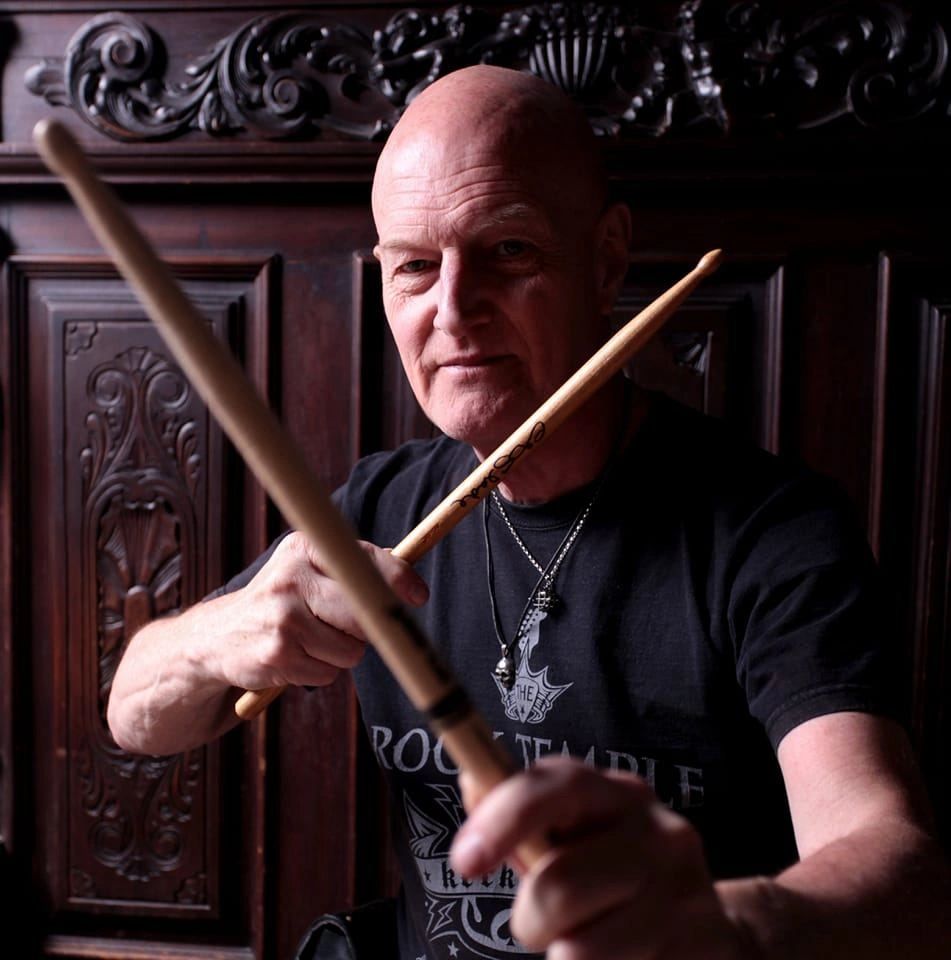
Renowned drummer Chris Slade, celebrated for his work with AC/DC, Manfred Mann’s Earth Band and numerous other legendary acts, has returned with his band, Chris Slade Timeline, to deliver a new album titled Timescape. Released in 2024, this album is a tour de force of classic rock, capturing the essence of decades of musical evolution, and it promises to be a delight for rock enthusiasts everywhere. Timescape is more than just an album—it’s a journey through rock history. Each track reflects a different era or style, showcasing Slade’s versatility and deep connection to the genre. The album is a seamless blend of original compositions and carefully chosen covers, paying homage to the bands and sounds that have shaped Slade‘s illustrious career. We had the honor to sit down recently with him for a great talk.
How are you doing?
Chris Slade: Good, thank you. Very good. How about yourself?
I’m doing great. I’m here in Nashville and it’s been raining for like three days, so as my wife likes to say, it’s the United States’ version of London. It’s a little rainy out here, but I enjoy it. Anyway, I’ve been listening to the album. Congratulations on releasing it. Where do I begin? It’s the most dynamic thing I’ve heard in a long time. You go from psychedelic to almost Judas Priest like metal, and your signature drum sound just fits so well. I pictured an aircraft carrier and then your pocket is as big as that. And then you’ve got some powerhouse players just running across the thing. It’s beautiful. So you’ve been playing with The Chris Slade Timeline for, I think I read, almost 10 years now. What made you decide to get together and make this album?
Well, we’ve been recording all the way through, but they’ve always been covers there have never been originals. We’ve done AC/DC, Asia, Uriah Heep, Manfred Mann’s Earth Band covers. About two and a half years ago, I discovered I can write melodies and I’ve no idea why. I’ve been writing lyrics most of my life since the ’70s, but it came to me that I could write melodies, which didn’t just mean melodies of songs. It meant bass lines, string lines, guitar arpeggios, keyboard parts and things like that. And it was very obvious when it came to me that’s what they were. But I can’t play any chordal instrument whatsoever. So I went to our keyboard player Mike Clark and told him I can sing and hum in tune. So that’s how it started, and I’m so pleased with the outcome.
Yeah, you don’t see double albums these days as much, and I was impressed with that. With the days of streaming, people are pushing more towards singles and stuff, but there are a ton of people out there that still want that concept album or those 20, 30 songs to really lay out and explore. I really like that you did that.
Chris Slade: Oh, great. Thank you. Yeah, it just came naturally. It was very organic, and it just grew, and the songs just grew. And they became what they were. Sometimes I’d think, “Oh, I need a chorus on this,” and I wrote one. It sounds a bit cheesy or whatever, but that’s what happened.
When I was doing some research, I came across an interview where you talked about getting the skills to write, you know, the drums, and the melodies, and you’re building that stuff. But it was impressive to me because as a guitar player that doesn’t sing, it’s kind of scary to write your own music and to even sing on it. And you’re playing drums, so it’s even more impressive. Sounds like you had a lot of fun in the studio.
It just happened.
So you’ve had quite a few different members. I know that the newer vocalist, I apologize, but his name escapes me. He sounds like Brian Johnson. Is that the newest member of the band?
Brian Davis. Yeah, he does a great job with the AC/DC stuff. He also sings “Sundance” on the original, the opening song on the original side. And “Back of the Vengeance,” he and James sing that together. On stage, the other singer is Stevie G, by the way. He also plays bass in the back. So, you know, they do a great job. We have two separate singers, one for AC/DC and one for Earth Band stuff. Maybe Uriah Heep, David Gilmour, Jimmy Page stuff, you know. So it’s a very varied set list that we do, which is mirrored in this CD. So it’s really, it’s a timeline.
And the name, yeah, exactly. It all comes together just so beautifully. It’s like you almost thought about this stuff before you put it out.
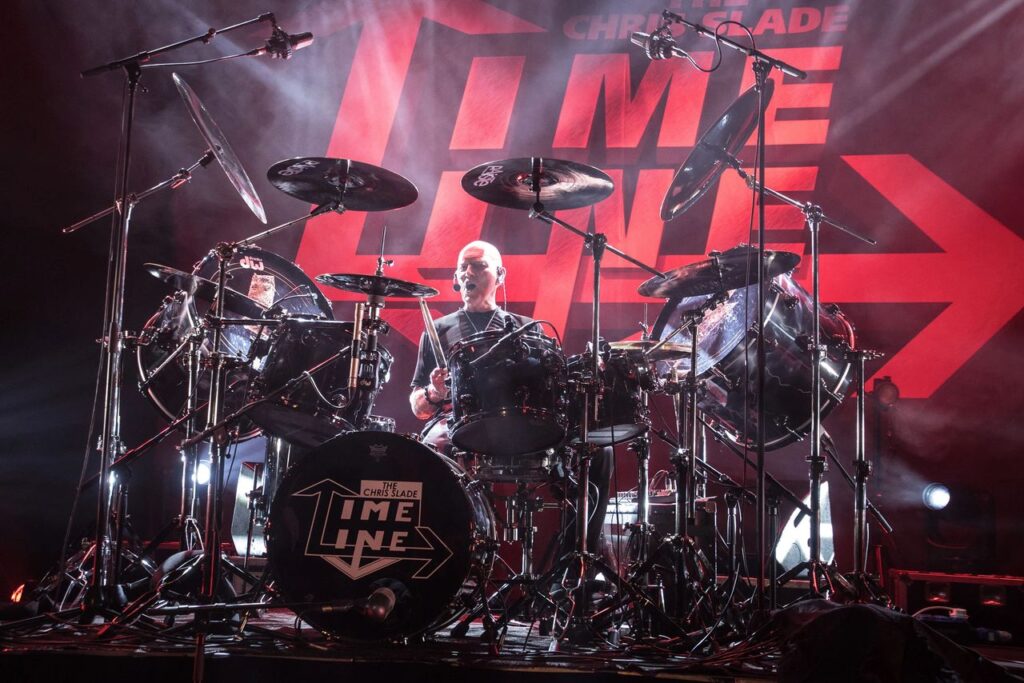
I’ve had a lot of time.
Speaking of David Gilmour, the first song I heard was “Time Flies” off the album. And I did not know that was you. It blew my mind that you did the vocals. But I just noticed how it sounded like older Pink Floyd, like “See Emily Play,” the real psychedelic era. And I was just like, I didn’t expect that at all. But it was super impressive that not only are you singing, you wrote it and you’re doing the drums on it. That was powerful.
Wow. Well, thank you very much. That came together, I must say, like most of it did, very organically. I’ve always put production ideas in, even in Manfred Mann’s Earth Band. So I’ve always loved doing that. And I love surprises. So when you first hear that, I think it’s quite a surprise. Some of the things I’ve got in there, which includes silence. I think silence is just as important sometimes.
And coming from an AC/DC drummer, it’s very important that you can go from as big as mountains to as little as a feather. So I agree, it’s very important.
Yeah, even when I do a drum solo, I always had silence in there, in the middle of a drum solo. Just silence. And people are going, “What’s he doing now?” But I think it’s very important. I think it’s like a Japanese concept, actually, which is the distance between things. I guess the distance is just as important as the thing itself.
That’s beautiful.
I always use that concept as much ife. To put it in a song, I thought it was… And it just happened naturally. I just thought, well, that’s the way the lyrics are going, why not just put silence in there?
Are you planning on doing any type of touring for it? I see that based on your Facebook, you’re playing in Europe a little bit. Do you have any plans for that?
We’ve always played in Europe. More than the UK, actually. We can get there quite easily. Last weekend, we were in Italy. And in a few weeks, we’re going to be there again. And then we’re going to Germany, and we’ve got a gig in France in a couple of weeks. So we were in Poland three months ago. And Czech Republic. So we haven’t stopped working, we always do. We just love to work. I love to play drums and we love performing. It’s in my blood. My father was a tap dancer and singer. And that’s probably where the rhythm comes from. And my brother, my older brother, taught me to play, first of all. So if you don’t like my playing, blame my brother, Danny. I was about 11 years old, I think, when I started playing on the side drum. He was in a marching band, so he used to bring the side drum home and he let me play on that. So that’s where I started, when I was 11 or 12 years old. Probably 11. I started with Tom at 16 years old. Before he was Tom Jones. And after. So he was called Tommy Scott before that. He changed his name to Tom Jones and he never looked back. I became Chris Slade and not Chris Slade Rees. Because it’s my middle name. And Jones was his middle name. There’s millions of Joneses in Wales. So that’s why he didn’t take Tom Jones straight away. But he did it.
And as I said, he never looked back. He’s 88 years old now or something. And he’s still recording, performing and singing.
I’m glad you brought up some of the artists you’ve worked with because I hear so many of their influences on the album in your originals. But then also, you kind of back it up with the covers and it’s pretty cool for the two types of fans. There are fans that like what you’ve done and they want to see your road to glory there. And then there’s fans who like original music and you’re kind of just giving everybody what they want. And it’s also kind of like a testament to “I still got stuff in the bank here, in my tank, I can go forever.”
Yeah. It’s as I say, that’s what our setlist is like. Just like that. It’s a mix of CD1 and CD2 and we have surprises in between. I don’t like giving a setlist out to anybody. I like things to be us. I like things to be a surprise.
So is there a venue or a city where you really get a warm welcome and you really enjoy playing?
We only work in Europe, so there’s not really one city. I wish we could work in the States, actually. But the problem is visas for the guys. I can work because I got a green card, but the band can’t at the moment. So we need work visas.
A few years ago, I saw Stewart Copeland of The Police play in Nashville with the symphony, and when I saw that, I instantly thought, “I bet Chris Slade would be awesome at this.” Have you ever thought about doing something like that?
I would love to do that. I’ve always liked that combination ever since Deep Purple did it decades ago. I’ve always liked classical music, even when I was a kid. I like all types. The only thing I’m not too fond of is opera. It doesn’t do much for me, but maybe I’ll write one.
Could imagine singing “Thunderstruck” with an operatic voice—it could be good!
Yeah, that could be done. Whether it would be accepted is another thing, right? But it’s possible to do it.
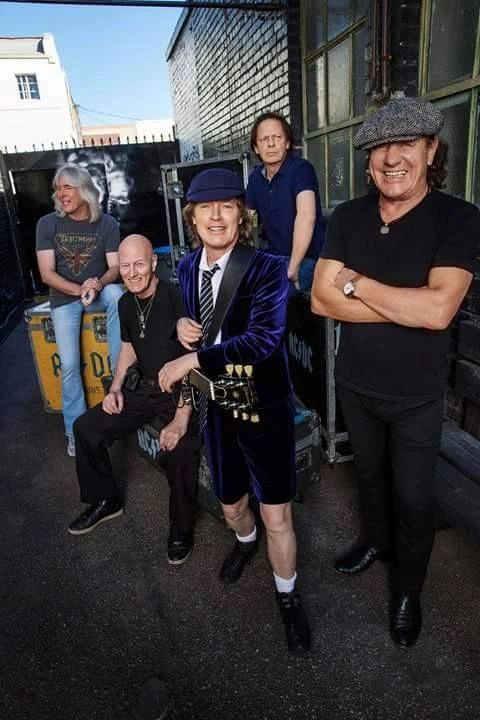
I’ll listen to it, I promise.
Yeah, it’s an idea. I love experimenting. As you can hear on this album, I just love to mix things up, maybe use a harp or something. You know what I mean? That’s how the saxophone on some tracks happened. People love it.
It’s like you almost went into a room full of toys—recording equipment—and you just had fun. You asked, “Does this need a shaker? Sure, let’s throw it on there.” I think that’s when the best, most innovative stuff comes out—when people don’t have any rules.
Yeah, no rules at all. All these original songs were experiments. “Time Flies” started as an experiment. All I had was an echo thing. “La da da da da da da da” and it went from there. I built it up from that alone and everyone said I always do demos of the songs with me singing. I wasn’t able to sing in tune but I always say I don’t have a voice. You know, when you work with Tom Jones and Paul Rodgers, why would you think you could be a singer?
And David Gilmour—he’s got a great voice, and people don’t give him the credit for it. He’s got a tremendous voice, but I’ve always said to him, “You’ve got an everyman’s voice, Dave.” I don’t mean you can’t sing, what I’m saying is you’ve got a voice that everybody can emulate. And that’s a trick—a real technique.
It’s good for harmony too. If you can match the key to someone else, you can do their harmony pretty easily. So it’s really handy.
Yes, yes, all of that.
If someone tells you you’re not a singer and you do it anyway, that’s the definition of rock and roll to me. Are you a rock star or are you not? That’s the question. You did it, so it’s freeing when you finally step out of your comfort zone and do something new.
Well, I’m all for trying things out. I really am. And if it hadn’t come off, it wouldn’t have mattered. I lost some money, but it actually just worked. I was so surprised and pleased that it did. And then we had this album. That was it. So I’m just excited to see where it’s going to go by the end of the year.
Do you have any plans for a music video? I know I’ve seen some live concert videos. Are there any plans to do a video for a single or anything?
I’ve got plans in my head, and I know a very good video producer. So, you know, it’s going to happen at some point, I’m sure. But the live footage—the second CD, by the way, was done live. We put it through a desk. It went into a recording desk just so we could mix it a bit better than just, you know, the phone stuff.
That’s the way to do it.
Yeah, you capture the energy. It’s the principle we used for the original side as well. We all play together at the same time. Of course, the amplifiers were separated and the drums were separated, but we were all in the studio at the same time playing. And that’s the way AC/DC records as well. Everybody’s there—Brian is in the booth, Mal and Angus with the guitars are zoned off somewhere, but they’re standing in the room playing. We’re all playing together. And that’s the principle I used to record Timeline because I like that idea—just all playing together.
It’s a real traditional feel—a lot of bands here in Nashville do that, especially the country guys. It gives it more of a live show feel—you capture energy that way. It just feels better.
And it’s usually the first take that’s the best.
Oh, yeah. Then you come to that term about 40 takes later, and you’re like, “Oh wait, the first one was fine.”
It often happens. It happens so much. I can’t tell you—the rest of them are just a waste of money, you know?
Back to AC/DC, so let’s see how I can form this into a question. When I was like eight years old, I saw—well, I memorized Live at Donington. I’ve always wanted to ask you this question. Those two toms that are on either side of you—are those floor toms, or are those kick drums that you’re hitting?
Kick drums. I love those sized kick drums. So, two with a head on both ends. You know, a real kick drum.
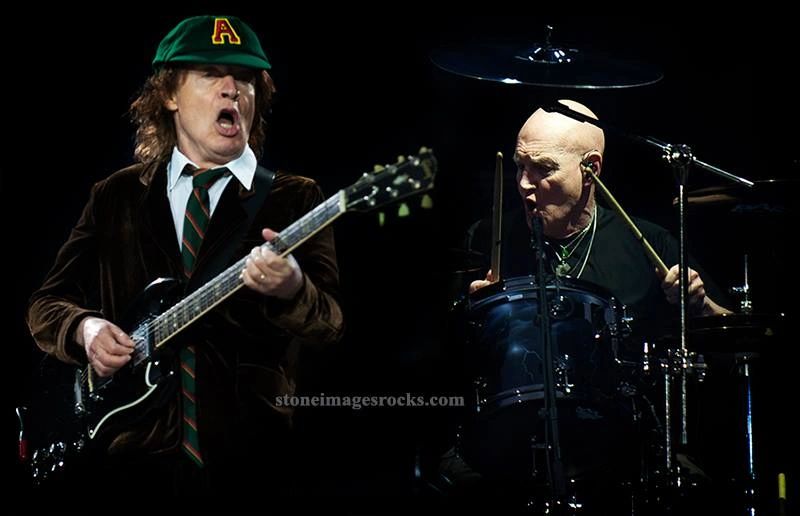
I’ve honestly wanted to ask you that since I was a little kid. You said that you live tracked the new album. What was different in the process of recording with AC/DC than it was with your Timeline band?
It’s not really that different. I’m looking out the window of the drum booth around the band. And sometimes I can point if they look at me and say, “You do that now!” Which is really good. We’ve rehearsed, of course. We tend to record together like that. It can be and feel really spontaneous. Which is the only way to convey something really. Right. Especially live, because that’s all you’ve got is spontaneity. You know, every musician has to—although you played it 12 nights before—you’ve got to be spontaneous on that night at the show, right? And then you’ve got to be spontaneous tomorrow night at the show, you know, and all while not playing over top of people as well.
Only systems do that, right? You learn that. You know, you’ve got to step up to the plate and do your thing. That’s why you’re a musician. So, I love spontaneity. When I first started playing drums at 11 or 12, as I said, I started listening to jazz and that stood me in good stead for Tom Jones because then we were a rock and roll band when we started. So, Jerry Lee stuff like that. And then Tom would throw a ballad in or something, and I’d have to learn to play all that, you know. Then he developed into a cabaret singer like Vegas and that sort of thing. I went with him because I was with him for seven years. So, I stopped around 1970. Wow. I started in ’63. 1963. And so, some of the tours were with big bands. A lot of them were, which I love playing with. I love ascending brush phrases and things like that. Because I started listening to Buddy Rich, you know, when I started. Nobody can play like Buddy, but you know, you get an idea of what you have to do, right? So he was a great influence and as a big band drummer. So I brought that to the table with Tom Jones. And you know, I did two live albums with Tom as well as some studio stuff. And nobody knows because there’s no credits on the albums. Tom just says about the band, he says, “On drums, we’ve got Chris. On guitar, we’ve got Jim.” No last names or anything. I did two of those. I did “Live in London”, “The Talk of the Town”, and “Live in Las Vegas.”
Wow.
And there’s no credit at all, which I thought was terrible. You get a good pub story, though, out of it.
So how is it different releasing an album, you know, 20, 30 years ago, as it is to now? Do you like it more now?
No, I think back then the ’60s and ’70s was a very creative time for lots of musicians and bands because we were making it up as we went along, you know and that’s how you learn. If you have the time, which we did, you try things, you experiment with things. Some things don’t work, but you gotta try. And then you go, “Oh, well, that didn’t work too well. Never mind. Go on to the next one.” But that’s how you’ve got to approach things. I think, as I say again, spontaneously. You’ve got to approach everything like that. And you have to be a nice person for a start. Because if you’re not, you aren’t going to keep a good band.
That’s the number one rule and no one tells you that either. You kind of just have to find out if you’re mean, no one’s going to call you back.
No, no they won’t. And if you get in a band you only last a few weeks because they’ll go, “I don’t like this guy.” Right.
And especially on that level because if you’re making Jimmy Page mad, you won’t last long.
Right. Oh, by the way, Jimmy Page also played on Tom’s first record.
Oh my goodness. That’s like—I mean, and he was in The Yardbirds and those guys connected to Eric Clapton and all the other people. That is crazy. I couldn’t imagine being around at that time making music. It’s almost like anything anybody did was legendary, you know? So it’s really cool to see everybody connected kind of behind the scenes. They don’t talk about that on VH1 as much. You really got to get these articles to find that stuff out.
Yeah, it’s incredible. And, you know, as far as people are concerned, we’re all multimillionaires and old rock stars and we fly around in our planes everywhere. Yeah, some do. 1% of bands do that, 1%. The other 99% drive everywhere or walk if you can.
It really goes to show you who paid their way in and who worked their way in. Because you can make it either way. But I think you get a little bit more heart if you worked towards it, you know, and then flashing your riches and stuff. I mean, you made it so you deserve it. But there’s good and bad ways to go about it.
Yeah. There are two ways in, I think, to the music business. You work like that and you pay your dues, playing pubs and clubs and all that sort of thing. Or Mummy and Daddy could pay for it.
That’s what I was about to say. Living in Nashville, I see it every single day. But, yeah, I love that if I worked hard at something, I understand what it feels like to lose it. If you got it with Mummy and Daddy’s money, if you lose it, you don’t appreciate it. So I think people feed off that and it kind of comes across when you write music.
Yeah, I still love it. You know, I still love getting in the van and driving to Italy, you know, or Portugal or somewhere like that, you know, or Spain. I just still get a buzz out of it and, you know, I will keep going as long as I get a buzz out of it. If I don’t. Yeah, that’ll be the end of it.
Do you have any, like pretty good or any advice for someone starting out?
Well, I’ve got two sons and they thought they started learning things. Okay they’re well grown now. And I said, don’t be a drummer. Whatever you do, don’t be a drummer, be a guitarist, be a singer, be a keyboard player. Don’t be a drummer. And they are both drummers.
It’s the opposite here. There’s about 10 million guitar players in about 1 to 2 drummers. So if you do find a drummer out here, he’s got like, five bands. And good luck getting them booked. But also you’ve proven that a drummer can write an awesome album. So maybe drums might be the way to go.
Yes. It gives you timing. So you know, at least there’s that and do that properly as a trick in itself or a technique, whichever way you look at those things. You really got to work at it because it’s difficult not to speed up when you’re trying to keep time for a band. I hear it all the time. You know local drummers, they tend to speed up, they get excited, and they’re off. It’s twice as fast when it finishes than when it started. So that’s one thing that’s for the aspiring drummers to work at. I’ve taught people how to control that. So you know, I’ve given two people some advice and talking to. And I’ve said, don’t rush, don’t rush. Let’s keep it even and slow, you know, or whatever, even if it’s a fast tempo.
Because you can portray energy in loudness with your playing instead of, you know, rushing to get that feeling of energy. It’s all about how you play that pocket, you know, and time is more important than playing.
Yeah. Pocket playing is more talked about more in the States than it is anywhere else in the world. And I like that phrase, about being an aircraft carrier.
I’m happy that I now follow Chris Slade Timeline on Facebook so I can keep up with you. I saw that you were thinking about putting the new album out on vinyl. Has any of that come to fruition?
I’d love to. There’s been a resurgence. I don’t know if it’s the same in the States. I was there this year, but there’s been a resurgence in UK and Europe of vinyl records. So, you know, they won’t sell fast, but they will sell, you know, maybe one or night, you know, in the gigs.
The people that are buying those understand that they’re collector items. So you can charge almost a, not a premium. I won’t say premium but a little bit more than normal. And then even if they don’t listen to it, it’s still art that they can hang on their wall, things like that. So yeah, I’m, I’m all for the, the record resurgence. I like it.
Yeah, I like it too. I got a big record collection. Oh I bet vinyl collection and you know it to me, it sounds better. Yeah. I don’t know if. Because it’s the sound I’m used to being my age or whatever, but I think there’s more response from a vinyl than there is from a CD. And then for there’s more. There’s more bass end, I think.
And then there’s just the process of putting the record on and flipping it, it becomes an event. I think people take it for granted that, you know, I can listen to any album or any song written in the history of man on my phone at any point. But the having a record collection, you can look through it. It’s all physical. Hold it in your hand, look at the artwork. I think I don’t want to say that that is lost with time. But I’m glad that with records coming back, people can experience it.
You’ve used the word there, and I think that’s true artwork. Speaker2: You know, it’s that’s that’s what it should be. It should be artwork, you know. Not so punky perhaps, although that’s good sometimes. Yeah. But artwork as a cover, I’m so pleased with the way that this one turned out.
It it accents the album. It kind of kind of paints a picture before you start listening, you know, kind of like where, not necessarily where it takes place, but it, you know that red with the clock and the, the red, like, burning. Look, you know, it’s just it’s really cool. Well I don’t want to hold you any longer. This has been surreal and now that I’ve got to tell my mom.
Thanks, Kris. I really appreciate that. Oh. If I get to Nashville, I’ll look you up.
Please. I would happily show you around. We can go wherever you want to. You want to go to the Ryman?
That’s great, man.
Interview by I’m Music Magazine Photographer/Writer Kris Cagle
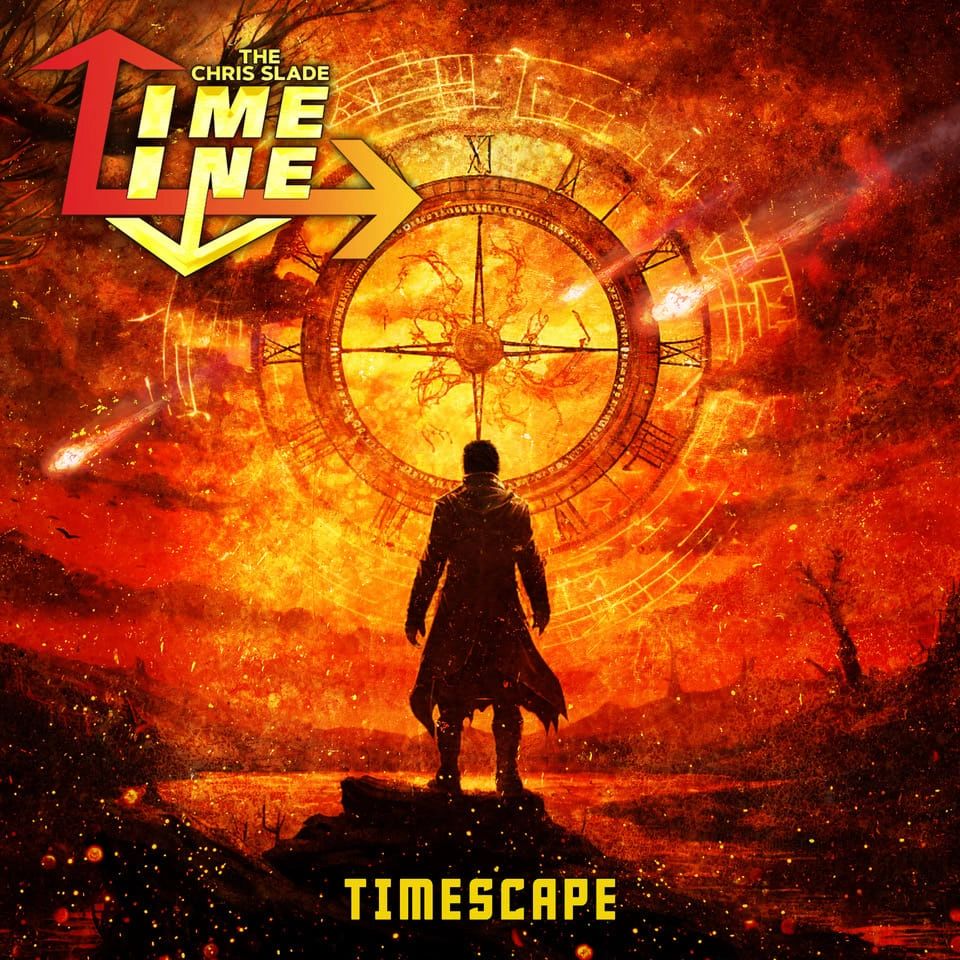
Connect with Chris Slade online:
Facebook: https://www.facebook.com/ChrisSladeACDC
Website: https://chrisslade.com



